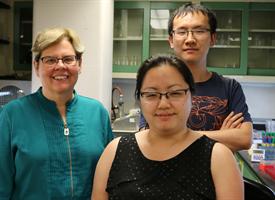
Beth Grayhack, Ph.D., with lab
members and grad students
Christina Brule and Jiyu Wang
Scientists for years have known that the genetic code found in all living things contains many layers of complexity. But new research from the University of Rochester cracks the code more deeply, clarifying for example why some genes are inefficiently translated into proteins.
Scientists have generally considered each piece of the genetic code (or codon) as a single “word” in a language. But the new data suggests some codon combinations act as compound words or phrases whose order and pairing has a significant impact on the translation of genes into proteins.